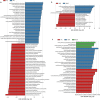The tongue coating microbiome is perturbed in atrial fibrillation and partly normalized after catheter ablation
- PMID: 40371119
- PMCID: PMC12075123
- DOI: 10.3389/fmicb.2025.1508089
The tongue coating microbiome is perturbed in atrial fibrillation and partly normalized after catheter ablation
Abstract
Background: There is accumulating evidence linking the microbiome and cardiovascular diseases. Nevertheless, no existing studies have been conducted on atrial fibrillation (AF) and the oral microbiome.
Materials and methods: We collected and sequenced 245 AF tongue-coating samples and 26 AF samples after catheter ablation from Zhengzhou and Guangshan, China. We characterized tongue coating microbiome, constructed microbial classifiers in the discovery cohort, and verified their diagnostic potential in a cross-regional cohort.
Results: Tongue coating microbial richness and diversity were significantly increased in the AF group compared to the control group, indicating increased bacterial colonization. The classifiers based on four optimal tongue coating microbial markers achieved good diagnostic efficiency in AF cohorts, with area under the curve (AUC) of 99.10 and 98.62% in the discovery and validation cohorts, respectively, and 97.97% in the cross-regional cohort. Paroxysmal AF and persistent AF shared similar taxonomic features, but some specific differential bacteria acted in the AF progression. Moreover, the outcomes revealed that catheter ablation contributed to rehabilitating oral bacterial disorders.
Conclusion: This was the first cross-sectional and longitudinal research of oral microbiome in AF patients and the alternations after catheter ablation, which offers promising new perspectives for AF clinical diagnosis and management.
Keywords: atrial fibrillation; biomarkers; catheter ablation; diagnosis; tongue coating microbiome.
Copyright © 2025 Wang, Li, Zheng, Huang, Cui, Cheng, He, Niu, Sun, Wang, Luo, Liu, Tan, Huang, Li, Ma, Li, Li, Li, Yu, Ren and Yuan.
Conflict of interest statement
The authors declare that the research was conducted in the absence of any commercial or financial relationships that could be construed as a potential conflict of interest.
Figures







References
-
- Asad Z. U. A., Yousif A., Khan M. S., Al-Khatib S. M., Stavrakis S. (2019). Catheter ablation versus medical therapy for atrial fibrillation: a systematic review and Meta-analysis of randomized controlled trials. Circ. Arrhythm. Electrophysiol. 12:e007414. doi: 10.1161/CIRCEP.119.007414 - DOI - PubMed
-
- Cavero-Redondo I., Peleteiro B., Álvarez-Bueno C., Rodriguez-Artalejo F., Martínez-Vizcaíno V. (2017). Glycated haemoglobin A1c as a risk factor of cardiovascular outcomes and all-cause mortality in diabetic and non-diabetic populations: a systematic review and meta-analysis. BMJ Open 7:e015949. doi: 10.1136/bmjopen-2017-015949, PMID: - DOI - PMC - PubMed
-
- Chinese Society of Pacing and Electrophysiology, Chinese Society of Arrhythmias, Atrial Fibrillation Center Union of China (2022). Current knowledge and management of atrial fibrillation: consensus of Chinese experts 2021. Chin J Cardiac Arrhyth 26, 15–88. doi: 10.3760/cma.j.cn113859-20211224-00264 - DOI
LinkOut - more resources
Full Text Sources

